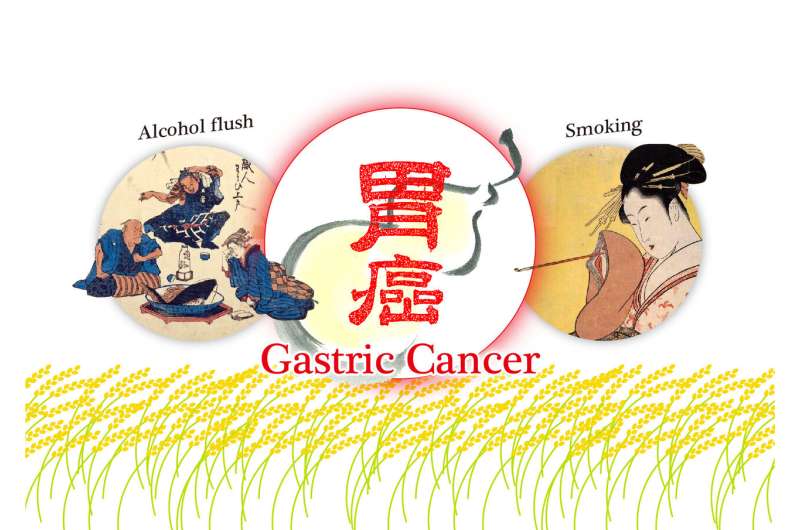Asian-specific inactive ALDH2 (an alcohol metabolism enzyme) genotype together with alcohol consumption and smoking, increase the risk of gastric cancer. Credit: Akihiro Suzuki, Hiroyuki Aburatani, Hiroto Katoh, Shumpei Ishikawa
A team of researchers affiliated with several institutions in Japan has found an increased risk of gastric cancer in East Asian people who have a certain gene mutation and who also have certain drinking habits. In their paper published in the journal Science Advances, the group describes their comparison of genetic data from hundreds of people with gastric cancers and what they learned about it.
Gastric cancer develops in the lining of the stomach. Prior research has shown that diet, age and various stomach diseases can have an impact on the chances of a given individual developing the disease. Prior research has shown that East Asians are more prone to developing the disease than any other group. In this new effort, the researchers looked into the possibility of gene mutations and alcohol consumption as risk factors for East Asian people.
The work involved comparing genetic data obtained from 513 gastric cancer patients, some Asian and some non-Asian. They also collected 243 tissue samples from Japanese volunteer patients—each of whom underwent whole-genome sequencing. The team also obtained genetic data from 76 additional Asian patients and from 212 non-Asian patients from publicly available medical databases.
After comparing and analyzing the data, the researchers found that one particular gastric-cancer-related subclass could be linked to a signature called Signature 16, which has been associated with an alcohol-consumption-related mutation. This has been linked to the ALDH2 gene, though mostly in Asian people. The researchers suggest that this was an indication that the combination of the gene mutation and alcohol consumption could be a risk factor for gastric cancers in Asian people. The researchers also found that gastric cancer patients with Signature 16 were not on average heavy drinkers, suggesting that drinking even small amounts of alcohol could put them at increased risk.
The researchers also found that the same cancer subtype could be associated with certain immunological features, which suggested that it might respond in unique ways to common immunotherapies that are used to treat gastric cancers. And they found that some gastric cancers that have been associated with loss-of-function CDH1 mutations occurred more frequently with Asian gastric cancer patients than with non-Asian patients.
More information: Akihiro Suzuki et al. Defined lifestyle and germline factors predispose Asian populations to gastric cancer, Science Advances (2020). DOI: 10.1126/sciadv.aav9778
Journal information: Science Advances
© 2020 Science X Network























